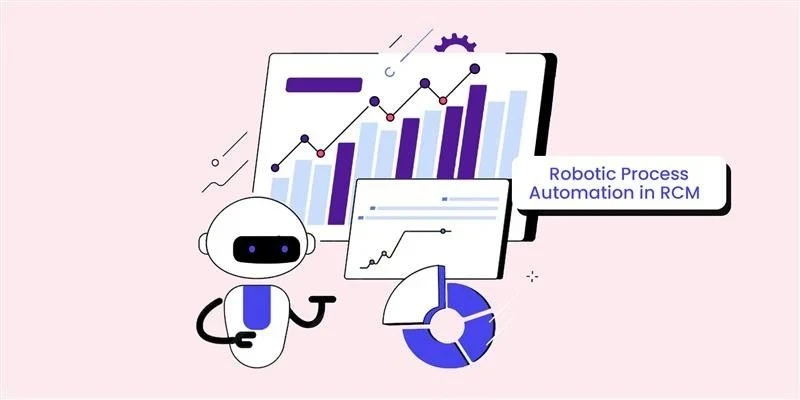In recent years, several revenue cycle management (RCM) technologies have emerged to meet different requirements and goals of healthcare providers. One of the most popular forms of technology in RCM is robotic process automation, commonly abbreviated as RPA.
RPA is the use of bots or programmes that imitate how a human performs high-volume, repeatable tasks, such as fetching and verifying data. This is the reason why RPA is considered one of the most desired technologies to optimize RCM.
RPA can benefit providers by streamlining revenue cycle management, allowing their staff to focus more on value-adding activities, including sorting out complex denials and tailoring payment strategies based on patient preferences.
What is Robotic Process Automation (RPA) and How it Benefits RCM
RPA is like a virtual assistant that takes care of repetitive and complicated tasks. The RPA technology mimics what the existing staff does on a day-to-day basis to free them up for more strategic areas of patient care.
Unlike a common belief, RPA does not replace healthcare staff members but works more like a digital assistant to carry out rule-based RCM operations. Say, for instance, it optimizes the processes of verifying insurance eligibility of patients, processing billing details, and handling appointment scheduling.
RPA also helps achieve accuracy and compliance across revenue cycle processes including claims processing. For example, it can scan claims against payer rules and regulations, cutting down denials due to common eligibility mistakes. Practices can also easily scale RPA technology to handle additional transaction volume, a feature many organizations will benefit.
In essence, RPA can ensure a seamless running of healthcare RCM processes.
Learn how Pain Management Group Revenue Leaps by 30% with Streamlined Claims Filing.
Top Use Cases of RPA in Healthcare RCM Operations
Now that you know the meaning and benefits of RPA in healthcare RCM operations, it is time to look at some of its use cases:
Patient Eligibility Verification
Ensuring that patients are eligible for the medical services that will be performed is a vital step to getting payments reimbursed quickly and correctly. However, most commonly, this is a laborious process wherein the staff checks the eligibility of all patients against the policies and procedures of each payer before the visit.
RPA technology can help streamline this manual operation by automating patient eligibility checks. It can integrate different streams of data from payer portals and the EHR or practice management system specifically to verify insurance status and eligibility, thereby saving on a large chunk of time for staff and minimizing the number of denials that occur due to issues related to medical eligibility.
Prior Authorizations
Prior authorization is one of the common pain points in healthcare. Providers consider prior authorization not only as the most burdensome regulatory issue they face but also a majority agree that it causes care delays, abandoned treatment, and adverse clinical outcomes.
Research has shown that requirements of prior authorization just keep increasing, overburdening healthcare providers. This is certainly why so many of them have been turning to the technologies which integrate RPA to help in completing prior authorization.
Practices can implement real-time RPA technology solutions for analyzing patient medical records to identify the necessary data elements for a request to obtain prior authorization.
The technology can also determine if a specific payer requires prior authorization for a particular service or not based on the rules and guidelines of the payer.
Appointment Scheduling
Practices have found that appointment scheduling, as well as other patient access tasks, can be both managed well and completed using RPA technology.
Since the onset of the COVID-19 pandemic, the patient no-show rates have risen. As one example, a 2022 MGMA poll discovered that about half of medical groups report an increase in their own rates.
Medical groups report that patients are reluctant to seek care due to prior-authorization delays, causing long wait times. These problems can be easily resolved by RPA as it automates the entire prior-authorization and scheduling workflow, reducing the scope of rescheduling and improving patient experience.
Claims Processing and Adjudication
It is no news that claims processing involves several steps wherein one must create and submit a claim to a payer for reimbursement, and providers receive a payment decision and need to post the payment depending on the outcome of the claim. In several instances, an error can result in delayed reimbursement or even denial of a claim.
RPA can be deployed in the claims processing and adjudication steps to prevent avoidable errors and cut down denials. It can also automate data entry by retrieving relevant details of claims.
Best Practices to Implement Robotic Process Automation (RPA) in RCM
Take a look at three best practices to implement robotic process automation (RPA) effectively in your healthcare RCM operations:
Start with High-Volume, Rule-Based Processes First
It is always suggested to target repetitive tasks such as eligibility verification or appointment scheduling, while beginning with RPA. Also, remember that this approach would provide quick wins, determine value, and maximize the ROI.
Most importantly, maintain the integrity of the process by documenting the existing workflows in detail.
Integrate RPA with Existing Systems
Ensure your RPA solution seamlessly connects with your EHR, practice management system, and payer portals. Implement robust data validation checks and regular testing protocols to maintain system integrity and prevent workflow disruptions.
Empower Staff Through Change Management
Position RPA as a digital assistant rather than a replacement. Train staff to handle complex tasks like denial management while automating routine work. Establish clear protocols for monitoring and managing RPA processes.
Parting Thoughts
We hope now you know the importance of robotic process automation in healthcare RCM operations.
Not to forget, the right vendor selection is an important requirement for RPA’s successful implementation. Hence, rely on a vendor who can help you manage the transition disruptions while implementing RPA in your revenue cycle.
RPA technology has found a happy home in the world of revenue cycle management, with quite a lot of providers reaping several benefits from its implementations.
This technology is simply laying down a foundation for more significant automation within healthcare.
In simpler words, RPA is important for today’s healthcare organizations to reduce costs and increase productivity as they position themselves for more sophisticated technology investments.







